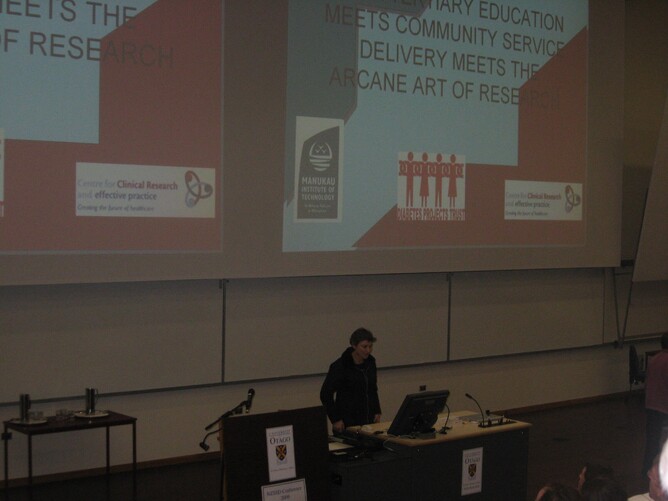A presentation at NZSSD in Dunedin delivered by Karen as part of a collaborative effort between DPT, CCRep and MIT looking at bringing different skills to evaluation of existing programmes run by DPT.
Abstract text:
WHEN TERTIARY EDUCATION MEETS COMMUNITY SERVICE DELIVERY MEETS THE ARCANE ART OF RESEARCH
Karen Pickering1, Diane Bermingham1, Kate Smallman1, Helen Scott2, Stuart Ryan3
1 Diabetes Projects Trust(DPT), 2 Manukau Institute of Technology (MIT), 3 Centre for Clinical Research and effective practice (CCRep)
Service delivery is often the first priority for small organizations which is appropriate when there are limited resources and an obligation to meet funder contract outputs. Quality evaluation is also vital however, and indicates whether what is being done is making a difference, to whom, why, how, and whether benefits are commensurate with cost.
Most contracts for health promotion/education-related services include an evaluation requirement. However, there is a significant difference between distributing a questionnaire (perhaps culled from material borrowed from another project) and committing to a formal evaluation process. The DPT has been delivering community-based programmes for 15 years. In that time research papers have been published but evaluations of the most recent programmes has been informal. Even so, these informal evaluations have provided evidence of programme popularity and acceptability, attitude and knowledge change, and sometimes behaviour change. What hasn’t been done is external evaluation meeting formal research criteria. DPT’s Healthy Workplaces programme is the case in point. While based on ‘research-based best practice’ when designed, and having built-in internal evaluation, there is potential for greater benefit and wider applicability if external validation was carried out.
To address this need DPT staff, Senior Nursing Tutors at MIT and Stuart Ryan from CCRep at Middlemore Hospital got together to create a multi-disciplinary team capable of carrying out such evaluation research. Our aims were, a) facilitate a collaborative relationship drawing on the different skills and perspectives of the three organisations, b) evaluate the DPT Healthy Workplaces programme, and c) publish the results with the view to adding to the body of knowledge in the area of workplace health promotion.
This presentation describes the process of making such a collaboration work, it examines similarities and differences of the organisations and how these can be capitalized on to work within a constructive relationship.


